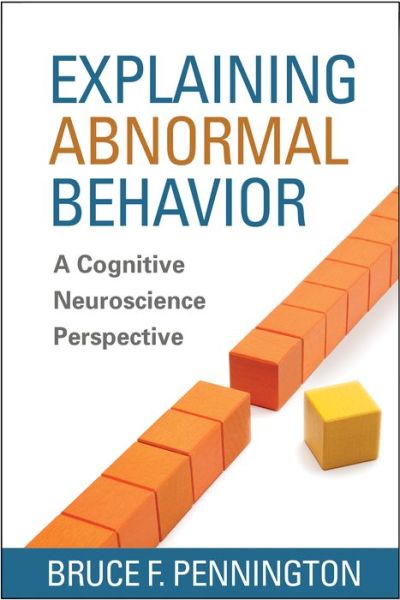Explaining Abnormal Behavior: A Cognitive Neuroscience Perspective epub
Par wood kevin le mardi, septembre 29 2015, 23:16 - Lien permanent
Explaining Abnormal Behavior: A Cognitive Neuroscience Perspective. Bruce F. Pennington
Explaining.Abnormal.Behavior.A.Cognitive.Neuroscience.Perspective.pdf
ISBN: 9781462513666 | 272 pages | 7 Mb

Explaining Abnormal Behavior: A Cognitive Neuroscience Perspective Bruce F. Pennington
Publisher: Guilford Publications, Inc.
In a previous post, I reviewed a study of minor physical abnormalities in a group of children with autism. Jan 30, 2013 - Albert Ellis, the father of cognitive-behavioral therapy and founder of Rational Emotive Behavior Therapy (REBT), discovered that people's beliefs strongly. May 27, 2014 - This has three parts to it which includes the psychodynamic perspective, behavioral and social cognitive prospective, and the humanistic perspective. Mar 15, 2014 - This paper raises important questions from a therapeutic perspective as drug design to date has focused on reducing Aβ in Alzheimer's disease. Nov 24, 2011 - For instance, there is evidence that people living during the Stone Age performed rudimentary cranial invasions called trephining in order to let the evils spirits out of the person suffering from abnormal behavior (Butcher, Mineka & Hooley, 2010). Apr 22, 2014 - Almost all women are attracted to sane, mature, happy guys, and pretty much all women are repelled by crazy, abnormal or depressed guys. In the case presented above, the behavioral theory would explain that although researchers suggest neurological factors contribute to schizophrenia, Sally may have learned many abnormal behaviors from her inconsistent parents. Jul 4, 2013 - Psychology is a versatile regulation and includes many sub-fields of study such areas as human development, sports, health, clinical, social behavior and cognitive processes. The word “belief” means a conviction in the truth, actuality, or validity of something. I know it kinda sounds like new-age bullshit, but there is a lot of scientific evidence showing that things like cognitive-behavioral therapy, mindfulness, gratitude exercises, writing about past traumas, and other good health habits can have profound impacts on your mental .. Apr 1, 2014 - Psychotherapists focus on the intra-psychic dynamics, conflicts, abnormal behaviors, thought disorders, or cognitive and emotional confusions of an individual and treat the client through the power of one-on-one conversations by providing Despite profound differences in what is considered effective treatment (use of medication vs. Dec 9, 2013 - An overview of Sally's case will be addressed as well as how biological, psychodynamic, cognitive, and behavioral theories can be applied to developing her treatment to her disorder. Apr 14, 2014 - And therapy, such as cognitive behavioral therapy (CBT) and acceptance and commitment therapy, can also help worriers stop the negative cycle, since they focus "on the idea of not wrestling and disconfirming the worries, but getting people to focus on their life and values and focus on the Moser recently had a study come out in the Journal of Abnormal Psychology, showing that the brains of worriers and non-worriers actually work differently in a stressful event. Ellis felt that by ignoring the role thinking played in emotional disturbance both psychoanalytic and behavior theory failed to explain how humans originally became disturbed and how they remained disturbed. Apr 22, 2013 - People who break free from benzodiazepine addictions tend to feel a lot better: Studies show that quitting leads to improvements in cognitive performance, mood and sleeping, and since the prolonged use of a benzodiazepine often causes as . Perspective, the behavioral perspective, and the cognitive-behavior perspective. 4 days ago - The entire group of children with ASD showed deficits in EF most notable in the flexibility, planning, behavioral regulation and monitoring metacognition; These deficits were present in ASD children who were high functioning as well as ASD children with I wanted to add a few comments to this discussion from a neuroscience perspective on the aging brain. We congratulate the authors on their study, which conclusively demonstrates that network hypersynchrony in APP/TTA transgenic mice is (1) reversible, (2) closely associated with behavioral abnormalities, and (3) not dependent on overexpressing APP/Aβ during early development. Does this explain mating in way you can relate to?
